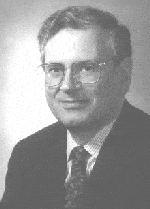
|
The Internet, and the UUCP and related networks connected to it, represents an outstanding example of a computer network with these qualities. It is an open network of networks, not a single unitary network, but an ensemble of interconnected systems which operate on the basis of multiple implementations of accepted, non-proprietary protocols, standards and interfaces. One of its important characteristics is that new networks, host systems, and users may readily join the network — the network is open to all. The openness (in all senses) of the Internet reflects, I believe, the sensibilities and values of its architects. Had the Internet somehow been developed outside the world of research and education, it’s less likely to have had such an open architecture. Future generations will be indebted to this community for the wisdom of building these types of open systems. – Mitchell Kapor, Electronic Frontier Foundation Information, 1993. |
Robert (Bob) E. Kahn, along with Vinton Cerf, is co-designer of the TCP/IP Internet network protocol. Kahn laid the open architecture foundations for the TCP/IP protocol, providing the Internet with one of its most distinctive features and what has proven to be a key advantage.
Kahn obtained a Ph.D. degree from Princeton University in 1964, worked for a while at AT&T Bell Laboratories, and then became an Assistant Professor of Electrical Engineering at MIT. He later went to work at Bolt Beranek and Newman, and helped build the Interface Message Processor.
In 1972, Kahn was hired by Lawrence Roberts at the IPTO to work on networking technologies, and in October he gave a demonstration of an ARPANET network connecting 40 different computers at the International Computer Communication Conference, making the network widely known for the first time to people from around the world.
At the IPTO, Kahn worked on an existing project to establish a satellite packet network, and initiated a project to establish a ground-based radio packet network. These experiences convinced him of the need for development of an open-architecture network model, where any network could communicate with any other independent of individual hardware and software configuration. Kahn therefore set four goals for the design of what would become the Transmission Control Protocol (TCP):
- Network connectivity. Any network could connect to another network through a gateway.
- Distribution. There would be no central network administration or control.
- Error recovery. Lost packets would be retransmitted.
- Black box design. No internal changes would have to be made to a network to connect it to other networks.
In the spring of 1973, Vinton Cerf joined Kahn on the project. They started by conducting research on reliable data communications across packet radio networks, factored in lessons learned from the Networking Control Protocol, and then created the next generation Transmission Control Protocol (TCP), the standard protocol used on the Internet today.
Kahn and Cerf designed powerful error and retransmission capabilities into TCP to focus on providing extremely reliable communications. The design was subsequently layered into two protocols, TCP/IP, where TCP handles high level services like retransmission of lost packets, and IP handles packet addressing and transmission. More information can be found on the TCP/IP page.
Kahn has continue to nurture the development of the Internet over the years through shepherding the standards process and related activities, and is now President of the Corporation for National Research Initiatives (CNRI), a not-for-profit organization which performs research in the public interest on strategic development of network-based information technologies.
Among other awards and honours, Kahn shared the Charles Stark Draper Prize for 2001 with Cerf, Leonard Kleinrock, and Larry Roberts for their work on the ARPANET and Internet.
Resources. The following publications provide additional information about Robert Kahn:
- Chapter 2- The Role of Government in the Evolution of the Internet; Revolution in the U.S. Information Infrastructure; National Academy of Sciences; 1994.
- RFC 6; Conversation With Robert Kahn; 10 April, 1969.